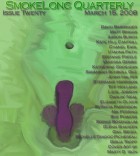The gender of the narrator is never revealed. Does it matter if the child is a boy rather than a girl, or vice versa? Are the implications different?
That’s a good question—I don’t think it does. When I wrote the story I imagined the narrator as a boy trying to find some sort of positive influence from his father, which he doesn’t. But if the narrator was a girl, you also have the missing mother, so either way there’s the absence of authority.
I love the pacing of this piece, especially the long sentence in the middle of the first paragraph. Can you hear the tempo while writing? Feel it in the keystrokes, perhaps? Do you read your work out loud to determine where to break, and where to expand?
I can definitely hear a tempo. When I’m writing and I think it’s going well I’m locked into a rhythm that I can’t really identify. I also tend to listen to music when I write, it helps me tune out the rest of the world, especially if I’m in a Starbucks or in my parents’ car or something. But I wouldn’t say I feel it in the keystrokes—I like to write by hand first. I don’t generally read my work out loud, unless I’m practicing to read in front of people, which always terrifies me.
Is this a coming-of-age story?
Yes and no. A lot of characters I write or try to write are in this age group—pre-teen or teen. I guess I haven’t shaken it yet. But it’s such a short story that I feel like maybe it’s more approaching coming-of-age than actually coming-of-age.
How long have you been a journalist? When did you start writing fiction?
I sort of fell into journalism right after college—I was reviewing films for a couple of websites and randomly got handed some amazing assignments, like going to the New Zealand set of The Chronicles of Narnia, interviewing people I’d idolized since I was really young. It’s hard to do a regular job—a 9-5—after that, so I’m just trying to find a way to make a living doing it, and to write about movies without feeding into the whole gossip culture. I’ve been writing fiction longer—since middle school—but it was on the back burner for a while, and now I’m in an MFA program, so it’s nice to have focus.
While reading through the annual Kathy Fish Fellowship applications, I was struck by the number of writers who were using flash as, to paraphrase, a means to an end. Most people weren’t writing flash because they loved the form, because it took them places other types of fiction didn’t. Instead, they were using it as a gateway into longer works—short stories, short story collections, novels. As a champion of flash, I found this discouraging. Is flash fiction less satisfying, in terms of either writing or reading, than longer works? Or is it that the markets still haven’t accepted flash as a legitimate form? Why do you write flash, and where do you see it taking you?
I’d never read or written flash fiction till I came to Emerson—Pamela Painter teaches a fantastic short-short class here—and the form was really difficult at first, but after a few weeks of trying and trying again, I found that the way I perceived a story had shifted, that illuminated moments could be as engaging as stories set over longer periods of time. I think it’s equally satisfying, if not more: you can take more risks, the arcs of stories are more natural. Since the stories are so short you can discover where you’re going while you’re writing—at least that’s what I’ve found. The stories that I’m proud of begin with an image or a line—if I know too much about the plot it usually doesn’t work. So the stories sort of grow organically. And it’s always really satisfying to write a complete narrative in a sitting, to figure out everything during one writing session, which happens very rarely with a longer work.



 The core workshop of SmokeLong Fitness is all in writing, so you can take part from anywhere at anytime. We are excited about creating a supportive, consistent and structured environment for flash writers to work on their craft in a community. We are thrilled and proud to say that our workshop participants have won, placed, or been listed in every major flash competition. Community works.
The core workshop of SmokeLong Fitness is all in writing, so you can take part from anywhere at anytime. We are excited about creating a supportive, consistent and structured environment for flash writers to work on their craft in a community. We are thrilled and proud to say that our workshop participants have won, placed, or been listed in every major flash competition. Community works.